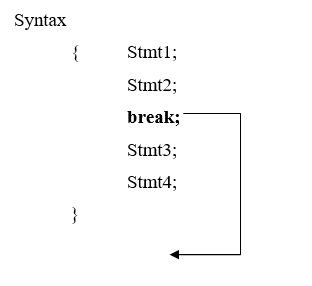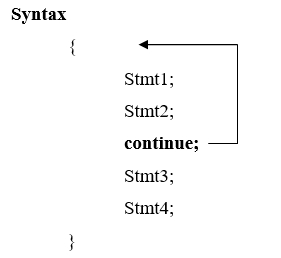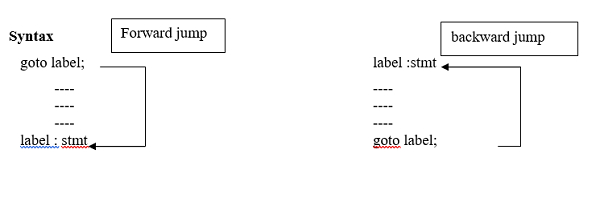什么是 C 语言的无条件跳转语句?
C 编程语言允许在语句之间跳转。它还支持 break、continue、return 和 goto 跳转语句。
break
- 它是一个用于终止循环(或)退出代码块的关键字。
- 控制权跳转到循环(或)代码块之后的下一条语句。
- break 用于 for、while、do-while 和 switch 语句。
- 当 break 用于嵌套循环时,只会终止最内层循环。
break 语句的语法如下:

示例
以下是 break 语句的 C 程序:
#include<stdio.h>
main( ){
int i;
for (i=1; i<=5; i++){
printf ("%d", i);
if (i==3)
break;
}
}输出
当执行上述程序时,会产生以下输出:
1 2 3
continue
continue 语句的语法如下:

示例
以下是 continue 语句的 C 程序:
#include<stdio.h>
main( ){
int i;
for (i=1; i<=5; i++){
if (i==2)
continue;
printf("%d", i)
}
}输出
当执行上述程序时,会产生以下输出:
1 2 3 4 5
return
它终止函数的执行并返回调用函数的控制权。
return 语句的语法如下:
return[expression/value];
示例
以下是 return 语句的 C 程序:
#include<stdio.h>
main(){
int a,b,c;
printf("enter a and b value:");
scanf("%d%d",&a,&b);
c=a*b;
return(c);
}输出
当执行上述程序时,会产生以下输出:
enter a and b value:2 4 Process returned 8 (0x8)
goto
它用于通过将控制权转移到程序的其他部分来跳过程序的正常执行顺序。
goto 语句的语法如下:

示例
以下是 goto 语句的 C 程序:
#include<stdio.h>
main( ) {
printf("Hello");
goto l1;
printf("How are");
l1: printf("you");
}输出
当执行上述程序时,会产生以下输出:
Hello you

广告

 数据结构
数据结构 网络
网络 关系型数据库管理系统
关系型数据库管理系统 操作系统
操作系统 Java
Java iOS
iOS HTML
HTML CSS
CSS Android
Android Python
Python C 编程
C 编程 C++
C++ C#
C# MongoDB
MongoDB MySQL
MySQL Javascript
Javascript PHP
PHP